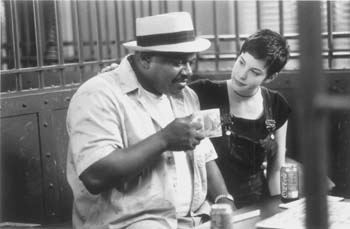![[Metroactive Movies]](/movies/gifs/movies468.gif)
[ Movies Index | Show Times | Metro | Metroactive Central | Archives ]
Easter Parade
Not Guilty as Charged: Willis (Charles S. Dutton) gets consoled by Emma (Liv Tyler) after being jailed for a crime he didn't commit in 'Cookie's Fortune.'
Robert Altman's latest is sugary, likable and, most of all, Southern
ONCE, TELEVISION TURNED Robert Altman's scarifying, dark-humored film M*A*S*H into a sitcom. Now, it seems, Altman has turned The Andy Griffith Show into an occasionally dark movie. But you can't expect Tennessee Williams with a title like Cookie's Fortune. The real-life antebellum hamlet of Holly Springs, Miss., is the setting for this story about the death of a matriarch. Jewel Mae "Cookie" Orcutt (Patricia Neal) commits suicide, not from despair, but from fear of old age. Worried about a scandal, Cookie's niece makes the suicide look like a murder.
Camille (Glenn Close) is the engineer of the plan, eating Cookie's suicide note on the spot and throwing away the old woman's pistol. Her half-witted sister, Cora (Julianne Moore), is Camille's accomplice, sworn to secrecy. Unfortunately, the apparent "murder" of Cookie calls out the local law. The prime suspect is Willis (Charles S. Dutton), her friend and handyman. No one in Holly Springs seriously believes Willis did it, but the out-of-town police insist on keeping the old man in jail. Meanwhile, Cookie's troubled great-niece, Emma (Liv Tyler), has returned to town. Her simmering affair with the Barney Fife-like deputy Jason (Chris O'Donnell) provides juvenile romance to counterpoint the aged Close, Neal and Dutton.
First-time screenwriter Anne Rapp was a script supervisor for everyone from Bill Forsyth (on Local Hero) to Steven Spielberg (on The Color Purple). Her work is full of cozily predictable quirks, derived from the Southern wave of the late '80s (Crimes of the Heart, Driving Miss Daisy, Steel Magnolias). Women of a certain age love tales of the modern South, where lassitude, comfort food and gorgeous real estate all come together, and inertia looks dignified. And Cookie's Fortune is mostly pleasantly inert. What stands out are a few nuggets, especially an empressy blues singer named Ruby Wilson singing at a bar at the beginning of the film. (R&B musician Rufus Thomas, auteur of the Funky Chicken, is the owner of the joint.) It's good to see Lyle Lovett's Buster Keaton-like face inflamed with risible longing as a fishmonger in lust with Emma.
Moore, whom I love, never does get a bead on her character. At times, Cora's a simpleton; at others, she's rebelling under the mask of compliance. Her transition scene comes when she has the title role in Camille's Easter pageant--it's Wilde's Salome. Moore does the dance of the seven veils at a Presbyterian church in a small Mississippi town--why does Altman cut away from that? For him, the real interest is the lumbering hero and moral center of the film, honest old Willis. Despite his troubles, he's without a mean bone in his skeleton, and his main interests are Wild Turkey and fishing. Cookie's Fortune is like Dutton, friendly, aimless, likable. Cookie's Fortune is Altman's most likable film in seven years. Still, isn't likability a form of decay when manifested by the artist who made M*A*S*H, Nashville, McCabe and Mrs. Miller and Short Cuts?
[ San Jose | Metroactive Central | Archives ]
![]()

Joyce Rudolph
Cookie's Fortune (PG-13; 118 min.), directed by Robert Altman, written by Anne Rapp, photographed by Toyomichi Kurita and starring Glenn Close, Patricia Neal and Charles S. Dutton.
From the April 8-14, 1999 issue of Metro.
Copyright © Metro Publishing Inc. Maintained by Boulevards New Media.